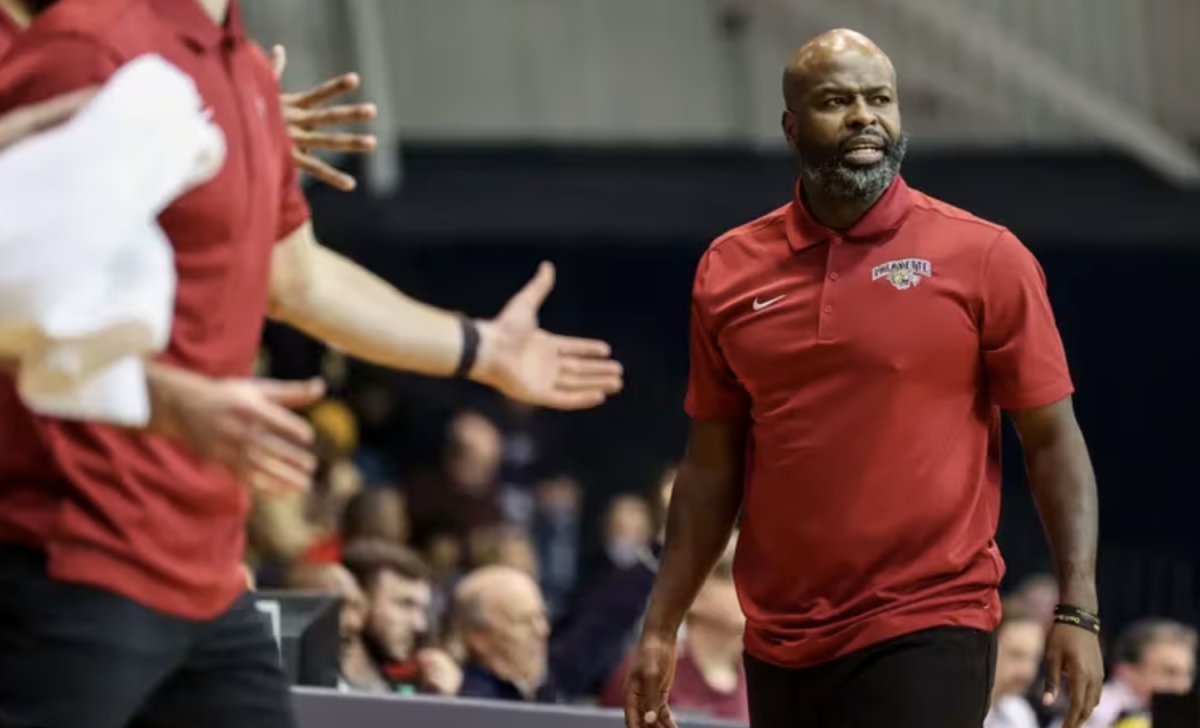
Mike Jordan was officially terminated in March. (Photo courtesy of The Philadelphia Inquirer)
Mike Jordan, the former men’s basketball coach, filed a federal lawsuit against the college alleging wrongful termination and racial discrimination.
The suit, filed on Nov. 14 in the Eastern District Court of Pennsylvania, claims that the investigation and subsequent termination of the coach earlier this year were biased and baseless. Jordan is seeking at least $5 million in damages, including payment of a nearly $1 million salary from his five-year contract and compensation for lost national exposure and harm to his reputation.
Jordan was investigated for his allegedly harsh treatment of players after one filed a complaint with the college. Lafayette, upon concluding its investigation, fired the coach for “gross misconduct and/or insubordination,” according to a section of Jordan’s termination letter quoted in the lawsuit.
Jordan’s firing “was a pretext for not paying him and for discrimination,” according to the former coach’s attorney, Riley H. Ross III of Philadelphia-based Mincey Fitzpatrick Ross, LLC.
Ross added that he did not know how the value of the contract of Jordan’s successor, Mike McGarvey, compares to that of Jordan’s. Audra Kahr, the college’s vice president for finance and administration, did not respond to requests for comment. The college’s legal office also declined to comment.
The salary of the men’s basketball coach is typically available on the college’s financial reports webpage, though figures beyond 2022 are not available.
In addition to the college allegedly stiffing Jordan of his contractual earnings, the lawsuit further alleges discrimination in that the college “immediately” promoted a protege of his, McGarvey, to the head coach position. According to the suit, McGarvey has “the same coaching mentality and philosophy” as Jordan.
The suit notes on three separate occasions that McGarvey is a white male.
The suit goes on to draw the same distinction between Jordan, a Black man, and another white, male basketball coach: his predecessor, Fran O’Hanlon.
O’Hanlon is portrayed in the suit as “the subject of repeated and severe complaints” regarding the “mistreatment of Black athletes because of their race” over the course of decades. The suit stated that both the athletic director and the vice president for campus life at the time were aware of such complaints. The Lafayette could not substantiate these claims.
“I think it’s pretty clear when you’re treating two people differently … the allegation here is that there’s a racial component to that,” Ross said.
Sherryta Freeman, the athletic director since 2018, did not respond to requests for comment, and Annette Diorio, the vice president for campus life during O’Hanlon’s tenure, declined to comment.
O’Hanlon did not respond to multiple requests for comment.
Jordan was fired just under a year into his tenure. In his time as head coach, the team had a record of 9-20 overall and 7-9 in the Patriot League. Following Jordan being placed on leave, the team lost its final two games of the regular season before winning two games in the Patriot League Tournament. The Leopards then went on to lose the conference championship against Colgate — the team for which Jordan coached prior to joining Lafayette.
In the suit, Jordan claims that he provided a list of 45 individuals to refute the claims made in the student complaint. According to Ross, this list of contacts included several people who witnessed practices and other interactions between Jordan and the players and would be willing to speak to investigators. The suit also claims it is “unknown if the college followed up with each of these witnesses.”
This is the second federal lawsuit that the college is facing in the span of one month.
Charlie Berman ‘24 contributed reporting.